|
The
release
of
a
double-bill
by
Spanish
filmmaker
Pedro
Almodóvar
combines
his
two
latest
short
films
and
an
interview.
I
reviewed
part
1,
his
gay
Western, Strange Way of Life, last month.
The second half-hour film, The Human Voice,
was
filmed
during
Covid
and
released
(but
not
distributed)
in
29029.
It
takes
up
another
cultural
icon:
Jean
Cocteau's
one-act
play La voix humaine (The Human Voice). The play served as the libretto for Francis Poulenc's 40-minute opera of the same name from 1958. Nothing is happening apart from a woman ("Elle") speaking on the phone to a lover who just abandoned her. The only structural element is provided by the repetitive phone disconnections caused by the rudimentary technology of a hundred years ago.
I have never liked La Voix humaine,
neither
Poulenc's
disruptive
score
nor
Cocteau's
female
protagonist
–
a
stereotypical
victim
of
the
male
imagination.
As
Cocteau
was
gay
his
play
begs
to
be
seen
as
a
parody
of
exaggerated
femininity
in
the
style
of
a
transvestite
show,
but
I
haven't
yet
seen
a
production
that
went
"camp"
with
the
hysterical
tears
and
self-loathing
("It
is
all
my
fault"),
the
fake
attempted
suicide,
and
other
traits
of
the
proverbial
"door
mat."
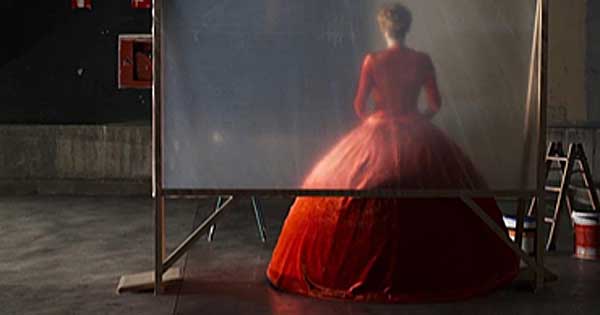
All great sopranos of the past and present have tackled the role, and
Almodóvar got the outstanding British actress Tilda Swinton (Caravaggio,
Orlando, I am Love) to star in his adaptation of the play. He had the good
sense to rewrite and shorten the tedious, repetitive phone conversation by
half. He is instantly ironic as much as iconic: we see the woman walking in
an exorbitant orange-red crinoline dress in a dirty cement hangar. She
takes her shimmering volumes behind a screen as if to point to the
separation between theatricality and realism, between operatic drama and
silver screen cool.
There is something timeless to the end of any affair. The next scene shows
Swinton in a medieval black dress that has the thickness of a depression.
She walks in clunky shoes like a penitent of some punishing religion – let's
call it love.
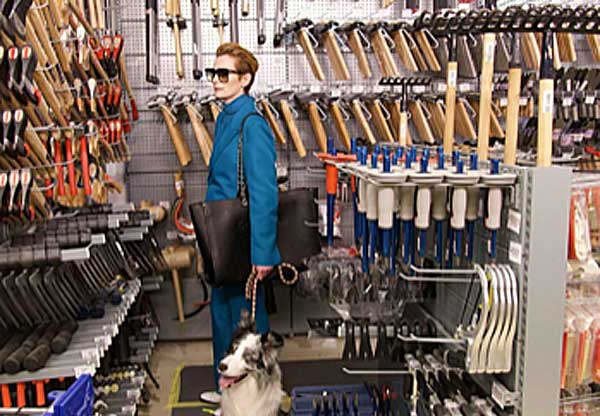
We spend a full ten minutes with her before the phone rings. First, she
enters a hardware store with a dog on a leash, now in a cerulean blue pants
suit, looking like a super model asking for an axe. The puzzled sales clerk
adds to the Hitchcockian frisson: the abandoned woman with a murder
weapon! It's as promising as when the abandoned heroine of
Almodóvar'sWomen on the Verge of a Nervous Breakdown laces the
gazpacho for her guests with handfuls of Xanax.
She wields her axe with fury – not at the faithless lover, however. She
hacks at his dark-blue suit which she has neatly laid out on his side of the
bed. The symbolic act satisfies in several ways: as a sign of revolt, perhaps
even voodoo revenge, and as the comic absurdity of a pulp fiction
meltdown. The lover's suitcases are lined up in the hall as a last bait
(another amusing reference to Women on the Verge). Her apartment is an
Almodóvar showcase: the designer furniture and accessories are as
obsessively stylish and creative as the director's own home—which we got
to see in his pre-Covid autobiographical feature, Pain and Glory. Here
again, he uses some of his own (two leopard-print chairs, for example) as if
decorating a secondary residence.
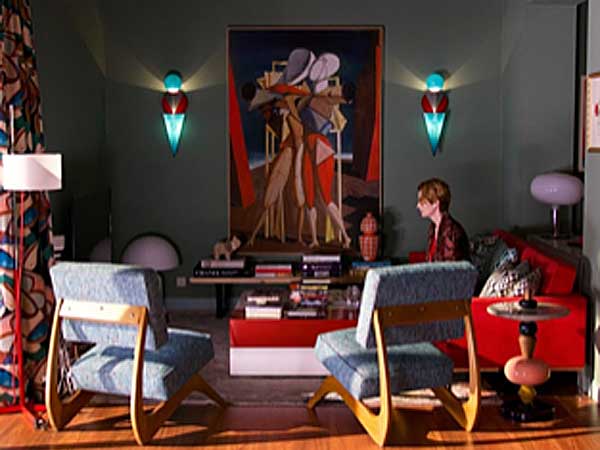
The director likes to claim that his sets are as important as his protagonists.
Several large paintings cover the walls. These paintings of couples and
nudes are the only sexual presence in the film -- they are oversized,
melodramatic and a bit kitschy. One of them is Artemisia Gentileschi's Venus and Amor, painted in a style one could regard as 17th century soft
porn. The loss of sexuality and intimacy is implied by the plush sets that
contrast with Swinton's mostly restrained, almost cool style of acting.
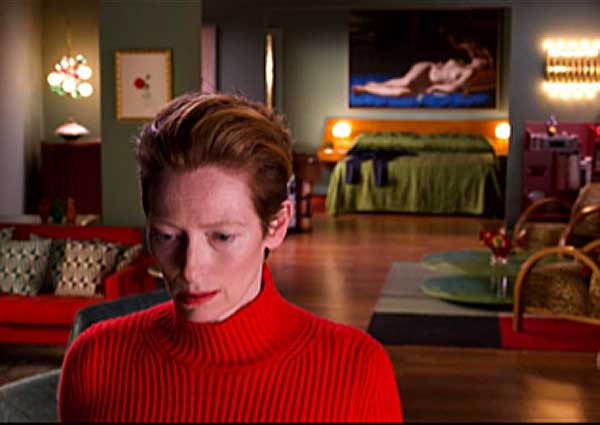
She calmly perfects her makeup and dresses in a red knitted bodysuit.
Then, looking glamorous, she takes a few red, yellow and white pills and
reclines on the bed. Not a tear. The dog acts out the drama of longing in
her place: he sniffs at the suitcases and runs back and forth through the
apartment, whining for his master.
The masterless dog licks her awake, the phone rings, she totters over and
the one-sided conversation begins. As in Cocteau's play, she pretends she
is perfectly fine – she went out with a friend, she went to see her shrink,
she heard from her agent and reports that women her age are back in
demand (well, not with him, alas). In short, she constructs a picture of
proud independence -- until it sinks in that this call is his sneaky way of
saying good-bye over the phone, for good.
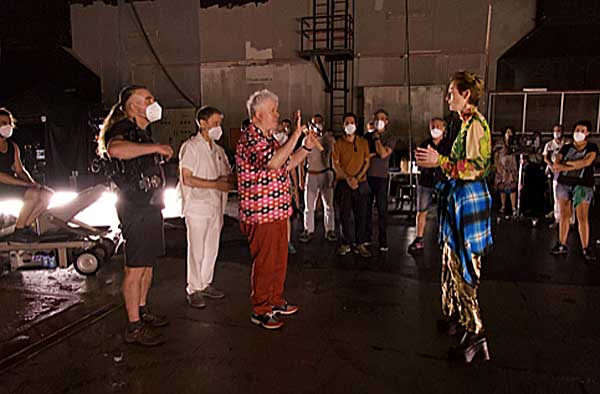
Instead of showing her go through the roof, Almodóvar does the opposite:
the camera swings upwards and reveals there is no roof. We are looking
down on the apartment in birds eye view, like looking at a dollhouse from
above. It's a stage set constructed inside the huge hangar that is in fact a
sound stage.
The effect is funny and enlightening: Everything in this drama (and
perhaps in all love stories) is a construct, a show, a fiction. A fiction held up
by the conventions of furnishings and fashion. The whole edifice of passion
is ironically held up by the nuts and bolts of the hardware store. As so often
with Almodóvar's cinematic design, the opening credits – with all the
hammers and nails, saws and pliers – reveal the "moral of the story."
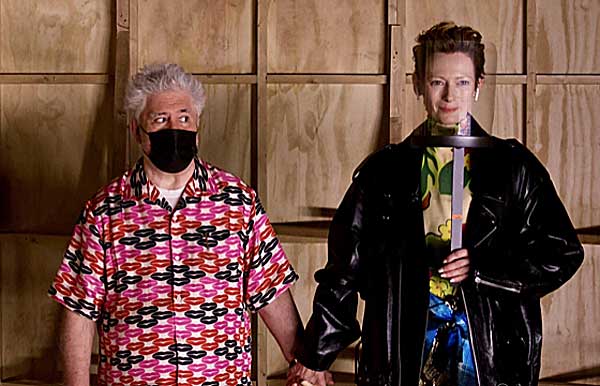
But this time, the woman is not left behind in tears, whispering endlessly,
"I love you…I love you… I love you" as in Cocteau's play. She keeps him on
the phone while she changes into a travel outfit with glittering pants and a
leather power jacket. She makes sure he can see her house from afar;
makes sure he pays attention. "I have to get used to hanging up on you,"
are her last words – and then she sets their love nest on fire.
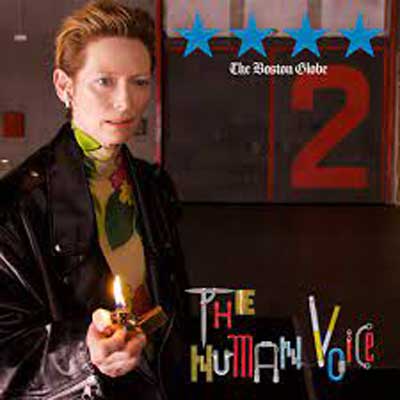
A spectacular catharsis --and as the fire brigade rushes onto the scene she
makes for the exit – with the dog. "I am your master now," she tells the
dog. "You'll get used to it, okay?" Why hanker after a lover when you can
strut away with his dog?
|